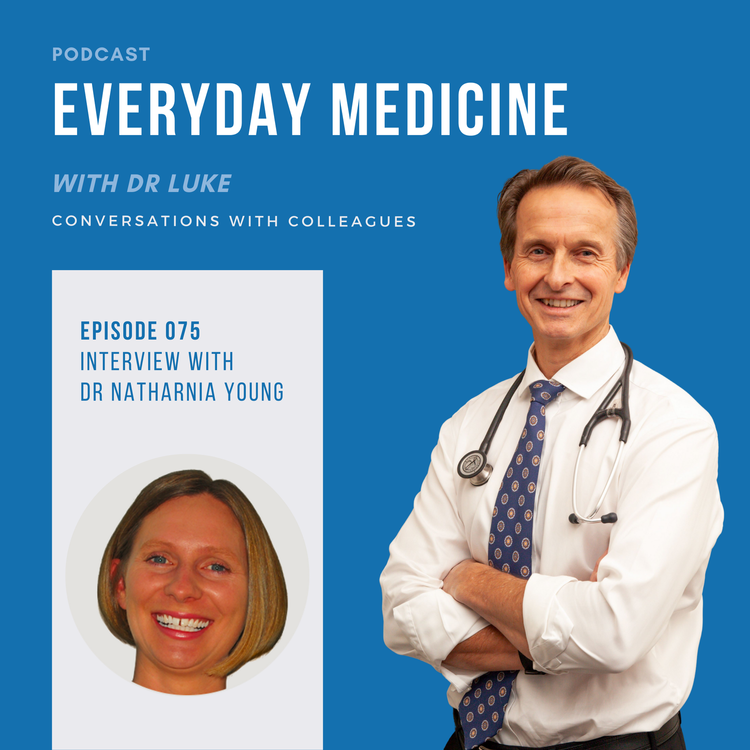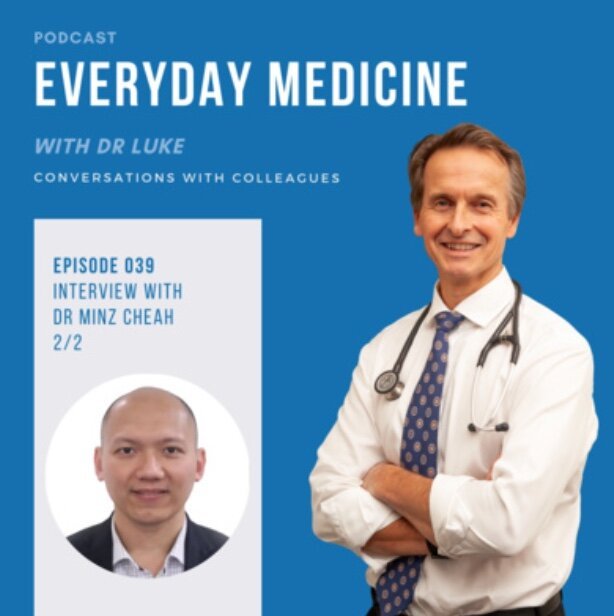Episode 75. Urinary Incontinence in Women with Dr Natharnia Young
Dr Natharnia Young is a leading urogynaecologist servicing South Eastern Melbourne’s suburbs and joins this conversation to discuss urinary incontinence in women, a condition associated with significant personal and social stigmatisation and affecting up to 1:2 women over the age of 70.
Dr Natharnia Young is a leading urogynaecologist servicing South Eastern Melbourne’s suburbs and joins this conversation to discuss urinary incontinence in women, a condition associated with significant personal and social stigmatisation and affecting up to 1:2 women over the age of 70.
Rates of presentation by woman seeking management for stress incontinence and urge incontinence are low, perhaps on account of feelings of embarrassment and shame however there are many effective management strategies that Natharnia discusses in this very informative podcast episode. Please enjoy the conversation.
Useful references include:
Dr Natharnia Young – Australian Pelvic Floor Institute. enquiries@afpsinstitute.com Urinary Incontinence – symptoms and causes – Mayo Clinic – www.mayoclinic.org Urinary Incontinence – Office on women’s health – www.womenshealth.gov Urinary Incontinence in Women – www.ncbi.nlm.nih.gov
To be a guest on the show or provide some feedback, I’d love to hear from you: manager@gihealth.com.au
Dr Luke Crantock MBBS, FRACP, is a gastroenterologist in practice for over 25 years. He is the founder of The Centre for GI Health, based in Melbourne Australia and is passionate about educating General Practitioners and patients on disease prevention and how to manage and improve their digestive health.
#urinaryincontinence #urogynaecologist #EverydayMedicine
Episode 67. Back Pain with Dr Max Kupershmidt
Before proceeding, we apologise for the audio quality in this week's episode. Unfortunately, we experienced some technical difficulties and we will endeavour to resolve these problems in future episodes of Everyday Medicine.
Before proceeding, we apologise for the audio quality in this week's episode. Unfortunately, we experienced some technical difficulties and we will endeavour to resolve these problems in future episodes of Everyday Medicine.
It is estimated that up to 80% of the population will experience back pain sometime in their lives with presentations from adolescent age to the elderly. Back pain is the third most common reason for visits to a medical practitioner and in many instances treatment strategies have already been sought elsewhere from chiropractors, physiotherapist myotherapists, personal trainers and osteopaths.
Radiological interrogation is often required to assist formulation of an appropriate treatment strategy and in this episode we discuss a radiological perspective of this problem with radiologist Dr Max Kupershmidt who has specialised in procedural radiology and musculoskeletal imaging.
Max completed radiology training at the Alfred Hospital in 2006 and worked there as an interventional radiology fellow before undertaking an Abdominal Imaging Fellowship in Toronto in 2008 . Max has been engaged in private radiology for the last 11 years and was a founding executive and treasurer of ARGANZ as well as running and organising many successful conferences and seminars. In this podcast we also discuss with Max the issue of radiation exposure in radiology noting that the average person may receive the equivalent of 3 mSv of radiation per year and that a plain chest x-ray delivers an equivalent of 7 days of background radiation and standard mammography about 7 weeks of equivalent background radiation. CT exposure with a modern scanner delivers approximately 2.6 years radiation, PET scans about 8 years equivalent exposure and MRI none. It is estimated that the additive lifetime risk from a CT scan from fatal and nonfatal malignancy is about 1 in 1100 (equivalent to the risk of drowning). As medical practitioners we all need to be aware of the exposure risk when ordering investigations particularly in our younger patients where the lifetime risk is very real. Please join this conversation with Max.
References:
Dr Max Kupershmidt: LinkedIn
www.cancer.org Understanding Radiation Risk from Imaging Tests
www.radiologyinfo.org Radiation Dose in Xray and CT Exams
www.racgp.org.au Radiation Safety
To be a guest on the show or provide some feedback, I’d love to hear from you: manager@gihealth.com.au
Dr Luke Crantock MBBS, FRACP, is a gastroenterologist in practice for over 25 years. He is the founder of The Centre for GI Health, based in Melbourne Australia and is passionate about educating General Practitioners and patients on disease prevention and how to manage and improve their digestive health.
Episode 45. Asthma with Dr Michael Ho
Australia has one of the highest rates of asthma in the world affecting about 11% of the population and in 2017/18 was responsible for 38,792 hospital admissions and 389 deaths, many of which may have been preventable. Asthma occurs when there is reversible expiratory constriction of the airways, especially the bronchioles and smaller bronchi, in response to various stimuli associated with a chronic inflammatory process. Today we are joined by Dr Michael Ho, an experienced respiratory physician who discusses:
Australia has one of the highest rates of asthma in the world affecting about 11% of the population and in 2017/18 was responsible for 38,792 hospital admissions and 389 deaths, many of which may have been preventable. Asthma occurs when there is reversible expiratory constriction of the airways, especially the bronchioles and smaller bronchi, in response to various stimuli associated with a chronic inflammatory process. Today we are joined by Dr Michael Ho, an experienced respiratory physician who discusses:
· Aetiology of asthma
· Non-drug approaches to management
· Pharmacological approaches to treatment
· Thunderstorm asthma
Please join me with this very interesting conversation with Michael covering many aspects of this common condition.
Useful references include:
To be a guest on the show or provide some feedback, I’d love to hear from you: manager@gihealth.com.au
Dr Luke Crantock MBBS, FRACP, is a gastroenterologist in practice for over 25 years. He is the founder of The Centre for GI Health, based in Melbourne Australia and is passionate about educating General Practitioners and patients on disease prevention and how to manage and improve their digestive health.
Episode 41. Primary Prevention of Cardiovascular Disease with Dr John Counsell [Part 1]
Heart disease affects one in six Australians with an AMI occurring every 10 minutes and accounts for one in four of all deaths, so primary and secondary prevention are very important considerations in relation to any patient presenting with heart disease or at risk of heart disease. Risk factors including family history, lipid abnormalities, diabetes mellitus, hypertension, smoking or those with elevated BMI all need consideration. Whilst there have been significant controversies regarding lipids management and the use of statins, the evidence for their use, particularly in secondary prevention of heart disease is clear.
Heart disease affects one in six Australians with an AMI occurring every 10 minutes and accounts for one in four of all deaths, so primary and secondary prevention are very important considerations in relation to any patient presenting with heart disease or at risk of heart disease. Risk factors including family history, lipid abnormalities, diabetes mellitus, hypertension, smoking or those with elevated BMI all need consideration. Whilst there have been significant controversies regarding lipids management and the use of statins, the evidence for their use, particularly in secondary prevention of heart disease is clear.
To discuss this interesting subject in detail we are joined by the very experienced cardiologist and local mentor Dr John Counsell who covers:
· Primary prevention in cardiovascular disease [Part 1]
· Secondary prevention in cardiovascular disease [Part 2]
· Use of statins and ACE inhibitors
Please join me in this very interesting conversation with John Counsell.
Useful references include:
To be a guest on the show or provide some feedback, I’d love to hear from you: manager@gihealth.com.au
Dr Luke Crantock MBBS, FRACP, is a gastroenterologist in practice for over 25 years. He is the founder of The Centre for GI Health, based in Melbourne Australia and is passionate about educating General Practitioners and patients on disease prevention and how to manage and improve their digestive health.
Luke has been offering interventional endoscopy for over 22 years. He is passionate about patient care and managing digestive health. He is highly regarded for technical ability and his compassionate approach to patients.
Episode 39. Muscle Joints Aches and Pains with Dr Minz Cheah
Based on the Australian Bureau of Statistics National Health Survey data about one in three people over the age of 18 living in Australia have hypertension or were taking blood pressure lowering medications. A staggering number requiring therapy for a condition which impacts on cerebrovascular disease, coronary artery disease, chronic kidney disease, heart failure and mortality.
Based on the Australian Bureau of Statistics National Health Survey data about one in three people over the age of 18 living in Australia have hypertension or were taking blood pressure lowering medications. A staggering number requiring therapy for a condition which impacts on cerebrovascular disease, coronary artery disease, chronic kidney disease, heart failure and mortality.
The National Heart Foundation guidelines are available for careful perusal, but to walk us through an intelligent approach to management of systemic hypertension we are joined by expert general physician Dr Minz Cheah who will discuss:
· Blood pressure targets
· Primary prevention
· Choice of hypotensive agent
This was an interesting conversation with Minz on a very important subject and I am happy to bring the episode to you.
Useful references include:
To be a guest on the show or provide some feedback, I’d love to hear from you: manager@gihealth.com.au
Dr Luke Crantock MBBS, FRACP, is a gastroenterologist in practice for over 25 years. He is the founder of The Centre for GI Health, based in Melbourne Australia and is passionate about educating General Practitioners and patients on disease prevention and how to manage and improve their digestive health.




![Episode 41. Primary Prevention of Cardiovascular Disease with Dr John Counsell [Part 1]](https://images.squarespace-cdn.com/content/v1/6246708462f6e814e578b7a3/1653455742358-BI3NZ2T49PTYKWSG4CCH/Dr%2BLuke%2BCrantock%2BEveryday%2BMedicine%2Bwith%2BDr%2BJohn%2BCounsell.jpeg)
